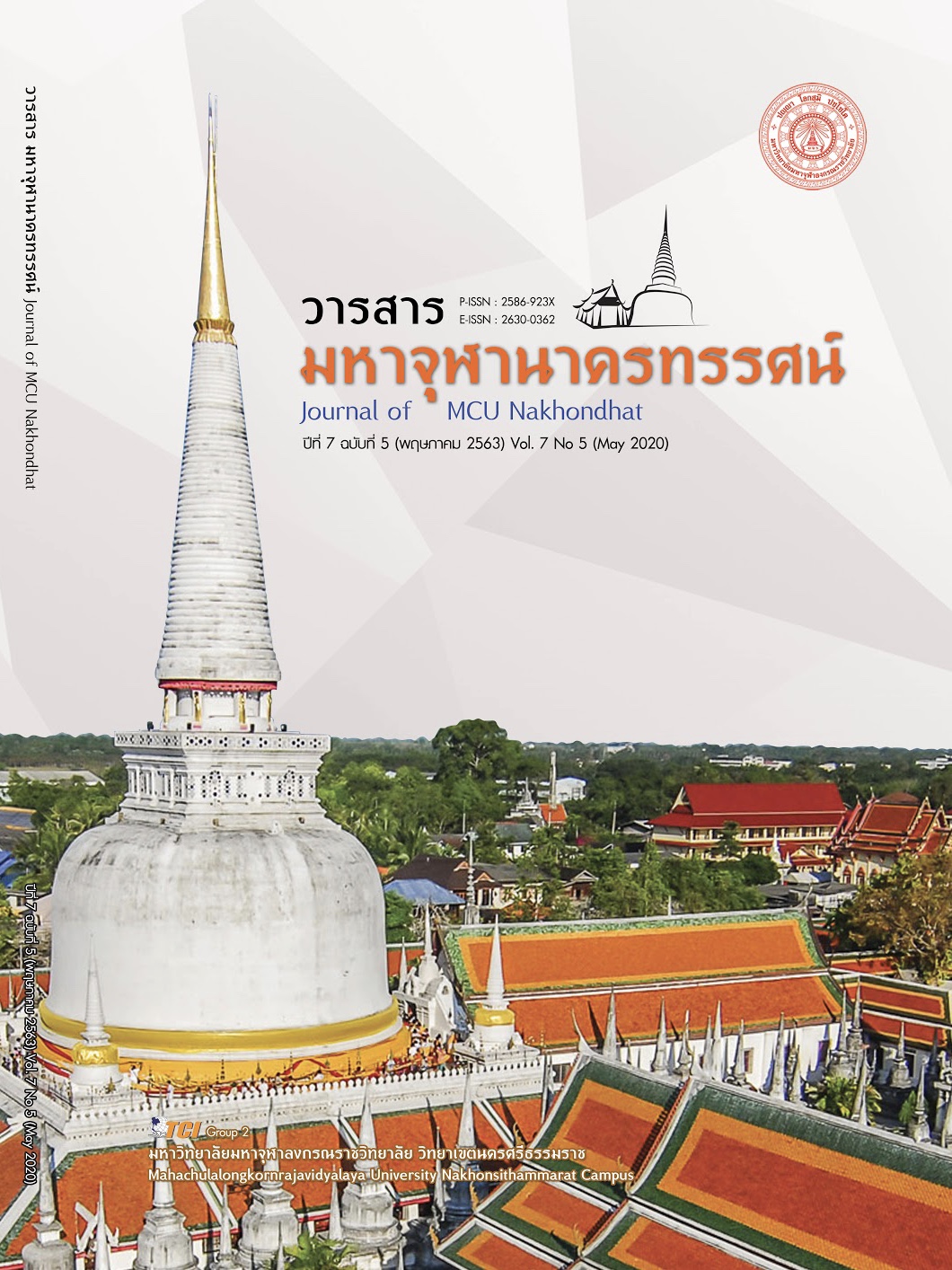TEACHING BEHAVIORS OF TEACHERS AND LEARNING OF STUDENTS
Main Article Content
Abstract
This article aimed to reflect the importance of theteachingbehaviors of teachers towards the learning of students. Even though the teaching and learning management had been implemented systematically with various methods and approaches for many decades, the students’ learning achievements were still unable to meet the needs of society desiring for the outcomes to be good and talented. Therefore, the teachers had to constantly improve their teachings. If the teachers could build faith for the students, naturally it was easy to cultivate them both knowledge ability in the subject matter and morality. Thus, the teachers must have spirituality of being teachers. Because the spirituality of teachers was reflected in the teaching behaviors of them as well as in every manner of their performances. Spiritual teaching behaviors of teachers could be considered from 3 main points: personality of teachers, knowledge and teaching behaviors.
Conceptual education, the theory of teaching behavior proposed by educators and scholars would be a guide to the development of teaching behaviors so that the teachers who had the potential of being spiritual could be successful in the teaching and learning management modernized according to the worlddisruption in the 21st century. In addition, the use of Brain - based learning concepts combinedwith the Synectics Strategy was another way to develop the learners to be good and talented as well. In this regard , the author had studied and led to the experiment and found that the achievement in teaching and learning activities achieved the satisfactory objectives.
Article Details
References
จินดา ลาโพธิ์. (2562). การพัฒนารูปแบบการสอนรายวิชาการสอนเขียนเชิงสร้างสรรค์สำหรับครูภาษาไทยตามแนวคิดการเรียนรู้โดยใช้สมองเป็นฐานผสมผสานกลวิธีซินเนคติคส์ สำหรับนักศึกษาระดับปริญญาตรี สาขาวิชาภาษาไทย. ใน ดุษฎีนิพนธ์ปรัชญาดุษฎีบัณฑิต สาขาวิชาวิจัยหลักสูตรและการสอน. มหาวิทยาลัยราชภัฏสกลนคร.
ทิพาพร สุจารี. (2553). การพัฒนารูปแบบการสอนภาษาอังกฤษเพื่อความเข้าใจโดยใช้ยุทธศาสตร์การเสริมต่อการเรียนรู้ประสบการณ์การอ่านสำหรับนักศึกษามหาวิทยาลัยราชภัฏ. วารสารมหาวิทยาลัยราชภัฎมหาสารคาม: ว. มรม, 4(3). 67-77.
ทิศนา แขมมณี. (2558). ศาสตร์การสอน. (พิมพ์ครั้งที่ 9). กรุงเทพมหานคร: สำนักพิมพ์แห่งจุฬาลงกรณ์มหาวิทยาลัย.
นวลจิตต์ เชาวกีรติพงศ์. (2542). การพัฒนารูปแบบการจัดการเรียนการสอนที่เน้นทักษะปฏิบัติสำหรับครูวิชาชีพ. ใน ดุษฎีนิพนธ์ครุศาสตรดุษฎีบัณฑิต สาขาวิชาหลักสูตรและการสอน. จุฬาลงกรณ์มหาวิทยาลัย.
ประยูร บุญใช้. (2549). เอกสารประกอบการสอนวิชา การเรียนการสอนเพื่อพัฒนาความคิด 1025305. สกลนคร: มหาวิทยาลัยราชภัฏสกลนคร.
ปริชมน กาลพัฒน์. (2558). การพัฒนารูปแบบการจัดประสบการณ์การเรียนรู้ เพื่อเสริมสร้างทักษะทางภาษาแบบองค์รวม สำหรับเด็กปฐมวัย. ใน ดุษฎีนิพนธ์ปรัชญาดุษฎีบัณฑิต สาขาวิชานวัตกรรมหลักสูตรและการเรียนรู้. มหาวิทยาลัยมหาสารคาม.
พรพิไล เลิศวิชา. (2552). การสอนภาษาไทยตามแนวคิด Brain Based Learning. กรุงเทพมหานคร: โรงพิมพ์ชุมนุมสหกรณ์การเกษตรแห่งประเทศไทย จำกัด.
ราชบัณฑิตยสถาน. (2556). พจนานุกรมฉบับราชบัณฑิตยสถาน พุทธศักราช 2554. กรุงเทพมหานคร: นานมีบุ๊คส์พับลิเคชั่นส์.
วัลนิกา ฉลากบาง. (2559). จิตวิญญาณความเป็นครู: คุณลักษณะสำาคัญของครูมืออาชีพ. วารสารมนุษยศาสตร์และสังคมศาสตร์ มหาวิทยาลัยนครพนม, 6(2), 123-128.
วิจารณ์ พานิช. (2555). วิถีสร้างการเรียนรู้เพื่อศิษย์ในศตวรรษที่ 21. กรุงเทพมหานคร: มูลนิธิสดศรี - สฤษดิ์วงศ์.
อดิพันธุ์ ประสิทธิ์. (2559). การพัฒนาการจัดการเรียนการเรียนรู้พลศึกษาโดยใช้สมองเป็นฐานเพื่อพัฒนาผลสัมฤทธิ์ทางการเรียนของนักเรียนชั้นมัธยมศึกษาตอนต้น. ใน ดุษฎีนิพนธ์การศึกษาดุษฎีบัณฑิต สาขาวิชาสุขศึกษาและพลศึกษา. มหาวิทยาลัยศรีนครินทรวิโรฒ.
Jensen, Eric P. (2008). Brain-based Learning: the new paradigmof teaching 2nd ed. California: Corwin Press.
Mayer, Tim. (2015). One Simple Word: From Creative Writing to Creative Writing Studies. College English, 71(3), 217-228.
Ozden, M. & Gultekin, M. . (2008). The Effects of Brain-based Learning on Academic Achievement and Retention of Knowledge in Science Course. Electronic Journal of Science Education, 12(1), 1-17.


